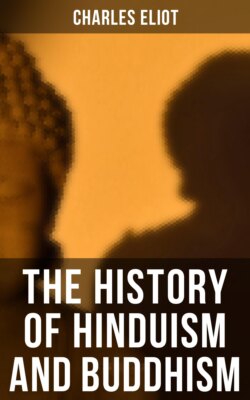Читать книгу The History of Hinduism and Buddhism - Charles Eliot - Страница 26
На сайте Литреса книга снята с продажи.
20. Church and State
ОглавлениеTable of Contents
I will now turn to another point, namely the relations of Church and State. These are simplest in Buddhism, which teaches that the truth is one, that all men ought to follow it and that all good kings should honour and encourage it. This is also the Christian position but Buddhism has almost always been tolerant and has hardly ever countenanced the doctrine that error should be suppressed by force[77]. Buddhism does not claim to cover the whole field of religion as understood in Europe: if people like to propitiate spirits in the hope of obtaining wealth and crops, it permits them to do so. In Japan and Tibet Buddhism has played a more secular role than in other countries, analogous to the struggles of the mediaeval European church for temporal authority. In Japan the great monasteries very nearly became the chief military as well as the chief political power and this danger was averted only by the destruction of Hieizan and other large establishments in the sixteenth century. What was prevented in Japan did actually happen in Tibet, for the monasteries became stronger than any of the competing secular factions and the principal sect set up an ecclesiastical government singularly like the Papacy. In southern countries, such as Burma and Ceylon, Buddhism made no attempt to interfere in politics. This aloofness is particularly remarkable in Siam and Camboja, where state festivals are usually conducted by Brahmans not by Buddhist ecclesiastics. In Siam, as formerly in Burma, the king being a Buddhist is in some ways the head of the Church. He may reform lax discipline or incorrect observances, but apparently not of his own authority but merely as an executive power enforcing the opinion of the higher clergy.
Buddhism and Hinduism both have the idea that the monk or priest is a person who in virtue of ordination or birth lives on a higher level than others. He may teach and do good but irrespective of that it is the duty of the laity to support the priesthood. This doctrine is preached by Hinduism in a stronger form than by Buddhism. The intellectual superiority of the Brahmans as a caste was sufficiently real to ensure its acceptance and in politics they had the good sense to rule by serving, to be ministers and not kings. In theory and to a considerable extent in practice, the Brahmans and their gods are not an imperium in imperio but an imperium super imperium. The position was possible only because, unlike the Papacy and unlike the Lamas of Tibet, they had no Pope and no hierarchy. They produced no à'Beckets or Hildebrands and no Inquisition. They did not quarrel with science but monopolized it.
In India kings are expected to maintain the priesthood and the temples yet Hinduism rarely assumes the form of a state religion[78] nor does it admit, as state religions generally have to admit, that the secular arm has a co-ordinate jurisdiction in ecclesiastical matters. Yet it affects every department of social life and a Hindu who breaks with it loses his social status. Hindu deities are rarely tribal gods like Athene of Athens or the gods of Mr. Kipling and the German Emperor. There are thousands of shrines specially favoured by a divine presence but the worshippers think of that presence not as the protector of a race or city but as a special manifestation of a universal though often invisible power. The conquests of Mohammedans and Christians are not interpreted as meaning that the gods of Hinduism have succumbed to alien deities.
The views prevalent in China and Japan as to the relations of Church and State are almost the antipodes of those described. In those countries it is the hardly dissembled theory of the official world that religion is a department of government and that there should be regulations for gods and worship, just as there are for ministers and etiquette. If we say that religion is identified with the government in Tibet and forms an imperium super imperium in India, we may compare its position in the Far East to native states under British rule. There is no interference with creeds provided they respect ethical and social conventions: interesting doctrines and rites are appreciated: the Government accepts and rewards the loyal co-operation of the Buddhist and Taoist priesthoods but maintains the right to restrict their activity should it take a wrong political turn or should an excessive increase in the number of monks seem a public danger. The Chinese Imperial Government successfully claimed the strangest powers of ecclesiastical discipline, since it promoted and degraded not only priests but deities. In both China and Japan there has often been a strong current of feeling in the official classes against Buddhism but on the other hand it often had the support of both emperors and people, and princes not infrequently joined the clergy, especially when it was desirable for them to live in retirement. Confucianism and Shintoism, which are ethical and ceremonial rather than doctrinal, have been in the past to some extent a law to the governments of China and Japan, or more accurately an aspect of those governments. But for many centuries Far Eastern statesmen have rarely regarded Buddhism and Taoism as more than interesting and legitimate activities, to be encouraged and regulated like educational and scientific institutions.
